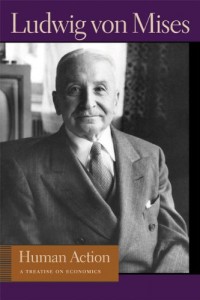Quote of the Day: The Revolt Against Reason
[social title=”” subtitle=”” link=”www.facebook.com/LUAtruth” icon=”fa-facebook”][social title=”” subtitle=”” link=”www.youtube.com/libertyunderattack” icon=”fa-youtube”]
 A short while ago, I began reading Ludwig von Mises’ Human Action, his treatise on economics that revamped the Austrian School here in America. It’s easy to ascertain the importance of this book. That said, in this Sunday’s edition of Liberty Under Attack Radio, we will be spending a bit of time discussing the “The Dangers of Ignoring Reason,” and I came across a fantastic excerpt that aligns perfectly with that from his book. It is too long to read for that segment, so I figured I would preface the broadcast with this. Enjoy.
A short while ago, I began reading Ludwig von Mises’ Human Action, his treatise on economics that revamped the Austrian School here in America. It’s easy to ascertain the importance of this book. That said, in this Sunday’s edition of Liberty Under Attack Radio, we will be spending a bit of time discussing the “The Dangers of Ignoring Reason,” and I came across a fantastic excerpt that aligns perfectly with that from his book. It is too long to read for that segment, so I figured I would preface the broadcast with this. Enjoy.
Human Action PDF and Audiobook
The Revolt Against Reason (pp. 72-75)
It is true that some philosophers were ready to overrate the power of human reason. They believed that man can discover by ratiocination the final causes of cosmic events, the inherent ends the prime mover aims at in creating the universe and determining the course of its evolution. They expatiated on the “Absolute” as if it were their pocket watch. They did not shrink from announcing eternal absolute values and from establishing moral codes unconditionally binding on all men.
Then there was the long line of utopian authors. They drafted schemes for an earthly paradise in which pure reason alone should rule. They failed to realize that what they called absolute reason and manifest truth was the fancy of their own minds. They blithely arrogated to themselves infallibility and often advocated intolerance, the violent oppression of all dissenters and heretics. They aimed at dictatorship either for themselves or for men who would accurately put their plans into execution. There was, in their opinion, no other salvation for suffering mankind.
There was Hegel. He was a profound thinker and his writings are a treasury of stimulating ideas. But he was laboring under the delusion that Geist, the Absolute, revealed itself through his words. There was nothing in the universe that was hidden to Hegel. It was a pity that his language was so ambiguous that it could be interpreted in various ways. The right-wing Hegelians interpreted it as an endorsement of the Prussian system of autocratic government and of the dogmas of the Prussian Church. The left-wing Hegelians read out of it atheism, intransigent revolutionary radicalism, and anarchistic doctrines.
There was Auguste Comte. He knew precisely what the future had in store for mankind. And, of course, he considered himself as the supreme legislator. For example, he regarded astronomical studies as useless and wanted to prohibit them. He planned to substitute a new religion for Christianity, and selected a lady who in this new church was destined to replace the Virgin. Comte can be exculpated, as he was insane in the full sense which pathology attaches to this term. But what about his followers?
Many more facts of this kind could be mentioned. But they are no argument against reason, rationalism, and rationality. These dreams have nothing at all to do with the question of whether or not reason is the right and only instrument available for man in his endeavors to attain as much knowledge as is accessible to him. The honest and conscientious truth-seekers have never pretended that reason and scientific research can answer all questions. They were fully aware of the limitations imposed upon the human mind. They cannot be taxed with responsibility for the crudities of the philosophy of Haeckel and the simplism of the various materialist schools.
The rationalist philosophers themselves were always intent upon showing the boundaries both of aprioristic theory and of empirical research. The first representative of British political economy, David Hume, the Utilitarians, and the American Pragmatists are certainly not guilty of having exaggerated the power of man to attain truth. It would be more justifiable to blame the philosophy of the last two hundred years for too much agnosticism and skepticism than for overconfidence in what could be achieved by the human mind.
The revolt against reason, the characteristic mental attitude of our age, was not caused by a lack of modesty, caution, and self-examination on the part of the philosophers. Neither was it due to failures in the evolution of modern natural science. The amazing achievements of technology and therapeutics speak a language which nobody can ignore. It is hopeless to attack modern science, whether from the angle of intuitionism and mysticism, or from any other point of view. The revolt against reason as directed against another target. It did not aim at the natural sciences, but at economics. The attack against the natural sciences was only the logically necessary outcome of the attack against economics. It was impermissible to dethrone reason in one field only and not to question it in other branches of knowledge also.
The great upheaval was born out of the historical situation existing in the middle of the nineteenth century. The economists had entirely demolished the fantastic delusions of the socialist utopians. The deficiencies of the classical system prevented them from comprehending why every socialist plan must be unrealizable; but they knew enough to demonstrate the futility of all socialist schemes produced up to their time. The communist ideas were done for. The socialists were absolutely unable to raise any objection to the devastating criticism of their schemes and to advance any argument in their favor. It seemed as if socialism was dead forever.
Only one way could lead the socialists out of this impasse. They could attack logic and reason and substitute mystical intuition for ratiocination. It was the historical role of Karl Marx to propose this solution. Based on Hegel’s dialectic mysticism he blithely arrogated to himself the ability to predict the future. Hegel pretended to know that Geist, in creating the universe, wanted to bring about the Prussian monarchy of Frederick William. But Marx was better informed about Geist’s plans. He knew that the final cause of historical evolution was the establishment of the socialist millennium. Socialism is bound to come “with the inexorability of a law of nature.” And as, according to Hegel, every later stage of history is a higher and better stage, there cannot be any doubt that socialism, the final and ultimate stage of mankind’s evolution, will be perfect from any point of view. It is consequently useless to discuss the details of the operation of a socialist commonwealth. History, in due time, will arrange everything for the best. It does not need the advice of mortal men.
There was still the main obstacle to overcome: the devastating criticism of the economists. Marx had a solution at hand. Human reason, he asserted, is constitutionally unfitted to find truth. The logical structure of mind is different with various social classes. There is no such thing as a universally valid logic. What mind produces can never be anything but “ideology,” that is in the Marxian terminology, a set of ideas disguising the selfish interests of the thinker’s own social class. Hence, the “bourgeois” mind of the economists is utterly incapable of producing more than an apology for capitalism. The teachings of “bourgeois” science, an offshoot of “bourgeois” logic, are of no avail for the proletarians, the rising class destined to abolish all classes and to convert the earth into a Garden of Eden.
But, of course, the logic of the proletarians is not merely a class logic. “The ideas of proletarian logic are not party ideas, but emanations of logic pure and simple.” Moreover, by virtue of a special privilege, the logic of certain elect bourgeois is not tainted with the original sin of being bourgeois. Karl Marx, the son of a well-to-do lawyer, married to the daughter of a Prussian Junker, and his collaborator Frederick Engels, a wealthy textile manufacturer, never doubted that they themselves were above the law and, notwithstanding their bourgeois background, were endowed with the power to discover absolute truth…


Trackbacks/Pingbacks